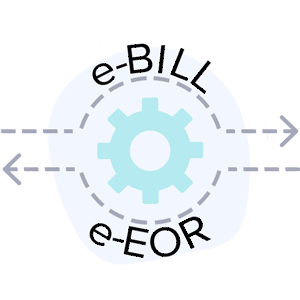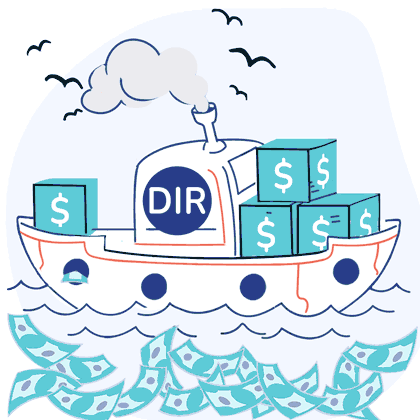CorVel’s Commitment to Compliance: A Shining Example for Payers

CorVel, a Third-Party Administrator (TPA) managing workers’ comp claims on behalf of insurers and employers, has demonstrated how workers’ comp works better when payers prioritize compliance with state laws and regulations.
After daisyBill reported missing electronic Explanations of Review (e-EORs) for thousands of California providers’ electronic bills (e-bills), CorVel wasted no time marshaling resources and personnel to tackle the problem (without daisyBill having to file a single Audit Complaint).
Our data below show that as of October 2025, CorVel has slashed its e-EOR non-compliance rate by half, returning e-EORs for 95% of providers’ bills this year so far.
CorVel’s proactive steps reveal more than just a willingness to resolve technical glitches. As Sedgwick’s provider abuse demonstrates, a TPA’s approach to payment compliance can reflect its overall treatment of employers and their injured workers.
Based on the data, CorVel treats providers (and their billing vendors) as partners in supporting injured workers’ recovery. Employers and insurers should take note.
CorVel Compliance Data: 2024 vs 2025
e-EORs are a critical component of e-billing. These files close the payment loop and automatically upload payment data to providers’ e-billing systems, saving practice staff countless hours of manual work.
California requires claims administrators to send an e-EOR within 15 working days of receiving a provider’s e-bill.
In 2024, CorVel failed to send e-EORs for 10% of all e-bills, with non-compliance rates trending upwards over the course of the year, from 6% in January 2024 to a high of 16% in December 2024.
In January 2025, daisyBill reported the 2024 data below to CorVel, as clearly, something was wrong.
e-Bill Submission Month |
daisyBill e-Bills Sent to CorVel |
e-EOR Missing Count |
2024 e-EOR Missing % |
2024-01 |
13,354 |
825 |
6% |
2024-02 |
13,568 |
1,143 |
8% |
2024-03 |
13,211 |
834 |
6% |
2024-04 |
14,273 |
950 |
7% |
2024-05 |
17,527 |
1,020 |
6% |
2024-06 |
14,682 |
703 |
5% |
2024-07 |
17,721 |
986 |
6% |
2024-08 |
17,242 |
2,214 |
13% |
2024-09 |
15,961 |
2,386 |
15% |
2024-10 |
17,663 |
2,386 |
14% |
2024-11 |
18,127 |
2,152 |
12% |
2024-12 |
17,506 |
2,814 |
16% |
Totals: |
18,413 |
10% |
When CorVel saw the data above, their teams immediately began analyzing EDI systems and calling for meetings with daisyBill.
With daisyBill helping to provide visibility into its EDI issues, CorVel’s teams worked on the problem until the e-EOR non-compliance rates plummeted to a low of 2% in August 2025.
As of this writing, CorVel has achieved 95% overall e-EOR compliance for all e-bills submitted by our providers in 2025. More importantly, CorVel continues to work to achieve 100% compliance. Below are CorVel’s 2025 compliance data, with the 2024 ‘e-EOR Missing %’ data for reference.
e-Bill Submission Month |
2025 e-Bills Sent to CorVel |
2025 e-EOR Missing Count |
2025 e-EOR Missing % |
2024 e-EOR Missing % |
2025-01 |
19,206 |
1,114 |
6% |
6% |
2025-02 |
16,439 |
965 |
6% |
8% |
2025-03 |
18,310 |
978 |
5% |
6% |
2025-04 |
21,288 |
1,131 |
5% |
7% |
2025-05 |
19,871 |
1,257 |
6% |
6% |
2025-06 |
18,893 |
1,083 |
6% |
5% |
2025-07 |
23,059 |
842 |
4% |
6% |
2025-08 |
21,833 |
438 |
2% |
13% |
2025-09 |
24,416 |
647 |
3% |
15% |
2025-10 |
14% |
|||
2025-11 |
12% |
|||
2025-12 |
16% |
|||
Totals |
183,315 |
8,455 |
5% |
10% |
Cooperation + Commitment = Compliance
When daisyBill reported the steadily worsening 2024 e-EOR compliance rates to CorVel, the TPA offered no excuses.
- Within a month, CorVel’s EDI teams had researched the root cause of the problem and modified internal processes to resolve the issues.
- Within two months, CorVel executives began meeting with daisyBill to review compliance data periodically and assess progress.
- At the most recent meeting between daisyBill and CorVel in October 2025, the fruits of the TPA’s clear commitment to doing right by providers were in evidence.
California workers' comp suffers from rampant non-compliance by claims administrators, resulting from years of inaction by the California Division of Workers’ Compensation (CA DWC), which has repeatedly failed to address well-documented violations substantively.
In this hyper-permissive environment, claims administrators are effectively on the honor system. And too often, honor is in short supply.
CorVel is a refreshing counter-example. On behalf of our providers, we thank this TPA for its efforts. If more payers took CorVel’s approach to compliance, California’s workers’ comp would serve employers and injured workers much more effectively.
daisyBill keeps track of payer compliance so you don’t have to. Click below for a closer look:
BILL BETTER: DAISYBILL
DaisyBill provides content as an insightful service to its readers and clients. It does not offer legal advice and cannot guarantee the accuracy or suitability of its content for a particular purpose.
.gif)





